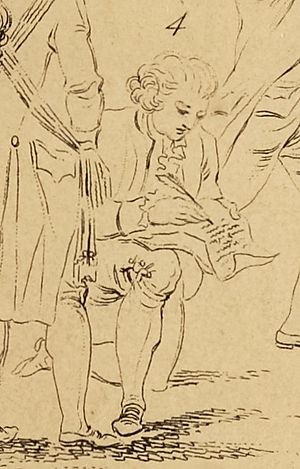Jacques Roux facts for kids
Quick facts for kids
Jacques Roux
|
|
|---|---|
 |
|
| Born | 21 August 1752 Pranzac, France
|
| Died | 10 February 1794 (aged 41) Bicêtre, France
|
| Cause of death | ... |
| Occupation | Priest, revolutionary |
| Known for | Radical revolutionary leader |
| Movement | Enragés |
| Opponent(s) |
|
Jacques Roux (born August 21, 1752 – died February 10, 1794) was a Catholic priest who played a big part in the French Revolution. He was known for his strong and "radical" ideas. This means he wanted big, fast changes in society.
Roux was very good at explaining his ideas to the crowds in Paris. He spoke about popular democracy, which means people having more power. He also talked about a classless society, where everyone is equal and there are no rich or poor groups. He especially connected with the sans-culottes. These were working-class people and shopkeepers in Paris. Roux helped turn them into a powerful force for the revolution. He became a leader of a group that wanted extreme changes.
A Revolutionary Leader
In 1791, Jacques Roux was chosen to be part of the Paris Commune. This was the local government of Paris during the revolution. When the French First Republic started in 1792, Roux joined a political group. Their enemies called them the Enragés, which means "The Enraged Ones" or "madmen."
Roux was seen as the most extreme voice for the poor people of Paris. He always fought for a society where everyone had the same amount of money and resources. He often spoke against the Jacobins, who were another powerful group. Roux believed the Jacobins were too focused on the wealthy.
He demanded that food should be available for everyone. He even said that rich people who hoarded food should be punished. Roux constantly spoke up for the poor people in Paris. He wanted the wealth of the rich to be taken and for bread to be affordable for everyone.
Roux became very popular. His strong voice helped remove the Girondins from the National Convention in 1793. The National Convention was the main governing body of France at the time. This happened as the split between the Girondins and the Montagnards (another group) grew bigger.
Manifesto of the Enragés
In 1793, Jacques Roux gave a very important speech to the National Convention. This speech is now called the Manifesto of the Enragés. In it, Roux demanded that private property should be ended. He also called for an end to class society, where people are divided by wealth. He said he was speaking for all the common people.
Many of Roux's ideas were ahead of his time. They were similar to some of the ideas that Karl Marx would develop much later. Marx was a famous thinker who wrote about how societies work.
Soon, Roux's powerful speeches started causing food riots. This upset the balance of power in the Paris Commune. Maximilien Robespierre, a powerful Jacobin leader, worried that Roux was a threat. Robespierre accused Roux of being a foreign spy. He claimed Roux was trying to cause trouble for the revolutionary government.
Even Roux's former friend, Jean-Paul Marat, turned against him. Marat wrote in his newspaper that Roux was not a true priest. He said Roux was only interested in money. In August 1793, Roux was arrested. He was accused of keeping money that was meant for two widows. Roux said he did nothing wrong. He believed his enemies were working against him. He was later released but was put in prison again on September 5, 1793.
Death
On January 14, 1794, Jacques Roux learned that his case would go to the Revolutionary Tribunal. This was a special court that judged people during the revolution. When he heard this, Roux tried to harm himself. He was 41 years old.
After Roux's death, the Enragés movement began to fade away. Another group, the Hébertists, tried to take over his supporters. They wanted to continue fighting for similar goals.
See also
 In Spanish: Jacques Roux para niños
In Spanish: Jacques Roux para niños
 | Kyle Baker |
 | Joseph Yoakum |
 | Laura Wheeler Waring |
 | Henry Ossawa Tanner |

